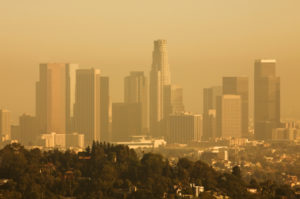And EPA’s Scott Pruitt Is Giving Them a Pass on Smog-Reducing Fuel Standards
About 79% of Americans want tougher federal fuel economy standards, but Scott Pruitt apparently is focusing on junk science from the auto industry, the same industry that once denied smog was a problem and claimed that “nobody knows” if seatbelts saved lives.

Pruitt, the administrator of the Environmental Protection Agency, is expected this week to take a step to sabotage fuel efficiency standards for cars and light trucks negotiated under former President Barack Obama by saying those rules are too strict. The standards could be for vehicles made from 2021 to 2025.
Our country’s cars, trucks, planes, trains and boats now produce more carbon dioxide that is making our planet hotter than the electric power sector does. That’s 1.9 billion tons of carbon dioxide produced each year by transportation, just slightly over the 1.8 billion tons produced by the electric sector.
But the Alliance of Automobile Manufacturers, the trade group that represents about a dozen car and light truck makers from BMW to Volvo, opposes tougher rules for fuel emissions.
ACTION BOX/What You Can Do About It

Tell the Alliance of Automobile Manufacturers and its member companies that we don’t want cars that are poisoning our planet. The alliance represents BMW, Fiat Chrysler, Ford, General Motors, Jaguar Land Rover, Mazda, Mercedes-Benz, Mitsubishi, Porsche, Toyota, Volkswagen and Volvo. The alliance can be reached at 202-326-5500 or write them at 803 7th St., NW, Suite 300, Washington, D.C. 20001. The alliance is also on Facebook.
Tell Pruitt your thoughts via his Facebook and Twitter sites. His email is [email protected]. His phone number is 202-564-4700.
Write him at:
USEPA Headquarters
William Jefferson Clinton Building
1200 Pennsylvania Avenue, NW
Mail Code: 1101A
Washington, D.C. 20460
A report filed by the alliance relies on bogus science such as a study by climate-change skeptic S. Stanley Young that says “most of the hundreds of papers on the relationship between air quality and mortality have serious statistical problems.”
Young’s paper was published in Regulatory Toxicology and Pharmacology, known for publishing positive articles on the tobacco industry written by people with ties to the tobacco industry.
Another paper, co-authored by Louis Anthony (Tony) Cox Jr., said people might not live longer if air pollution from ozone and small, breathable particles were reduced. Cox is the new chairman of the EPA’s Clean Air Science Advisory Committee and Young is on the EPA’s Science Advisory Board.
The auto industry has a long history of touting hyperbole over reality when advancing its interests. Henry Ford II called the 1966 requirements for seat belts and safety glass “arbitrary, unreasonable and technically infeasible.” Lee Iacocca, then Ford’s executive vice president, said the Clean Air Act “could prevent continued production of automobiles.”
The alliance told Pruitt on his first day on the job that the rules “should be reviewed and withdrawn” and spent $8.1 million on federal lobbying last year. Its lobbyists include Hunter Bates and Chase Hieneman who both previously worked for Senate Majority Leader Mitch McConnell (R-Ky.)
The tougher rules, set in 2012, would cost the auto industry about 3% of gross sales for new cars and light trucks and save motorists $1.7 trillion in fuel costs over the life of the vehicles, or more than $8,000 a vehicle by 2025.
The Obama standards would regulate emissions of greenhouse gases and require automakers to manufacture cars and light-duty trucks that average 54.5 miles a gallon by 2025. Current standards require American-made cars, SUVs and light trucks to meet a combined average of at least 35 miles a gallon by 2020.
Please help us continue covering what the government is up to.
[wpedon id=”4360″ align=”center”]




